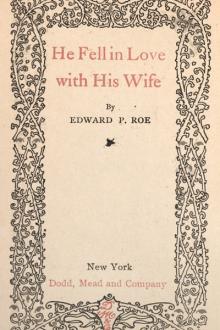He Fell In Love With His Wife - Edward Payson Roe (the speed reading book .txt) 📗

- Author: Edward Payson Roe
- Performer: -
Book online «He Fell In Love With His Wife - Edward Payson Roe (the speed reading book .txt) 📗». Author Edward Payson Roe
“But—but HE’S been here,” she faltered; “you don’t realize—”
“I don’t believe I do or can, yet, Alida, dear, but that blessed Jane’s spying
trait has served me the best turn in the world. She heard every brave word
you said and I shed tears of joy when she told me; and tears are slow coming
to my eyes. You think I shrink from you, do you?” and he kissed her hands
passionately. “See,” he cried, “I kneel to you in gratitude for all you’ve
been to me and are to me.”
“Oh, James! Please rise. It’s too much.”
“No, not till you promise to go with me to a minister and hear me promise to
love, cherish—yes, in your case I’ll promise to obey.”
She bowed her head upon his shoulder in answer. Springing up, he clasped her
close and kissed away her tears as he exclaimed, “No more business marriage
for me, if you please. There never was a man so in love with his wife.”
Suddenly she looked up and said fearfully, “James, he threatened you. He said
you’d never be safe a moment as long as I stayed here.”
His answer was a peal of laughter. “I’ve done more than threaten him. I’ve
whipped him within an inch of his life, and it was the thought of you that led
me, in my rage, to spare his life. I’ll tell you all—I’m going to tell you
everything now. How much trouble I might have saved if I had told you my
thoughts! What was there, Alida, in an old fellow like me that led you to
care so?”
Looking up shyly, she replied, “I think it was the MAN in you—and—then you
stood up for me so.”
“Well, love is blind, I suppose, but it don’t seem to me that mine is. There
never was a man so taken in at his marriage. You were so different from what
I expected that I began loving you before I knew it, but I thought you were
good to me just as you were to Jane—from a sense of duty—and that you
couldn’t abide me personally. So I tried to keep out of your way. And,
Alida, dear, I thought at first that I was taken by your good traits and your
education and all that, but I found out at last that I had fallen in love with
YOU. Now you know all. You feel better now, don’t you?”
“Yes,” she breathed softly.
“You’ve had enough to wear a saint out,” he continued kindly. “Lie down on the
lounge and I’ll bring your supper to you.”
“No, please! It will do me more good to go on and act as if nothing had
happened.”
“Well, have your own way, little wife. You’re boss now, sure enough.”
She drew him to the porch, and together they looked upon the June landscape
which she had regarded with such despairing eyes an hour before.
“Happiness never kills, after all,” she said.
“Shouldn’t be alive if it did,” he replied. “The birds seem to sing as if they
knew.”
Jane emerged from the barn door with a basket of eggs, and Alida sped away to
meet her. The first thing the child knew the arms of her mistress were about
her neck and she was kissed again and again.
“What did you do that for?” she asked.
“You’ll understand some day.”
“Say,” said Jane in an impulse of good will, “if you’re only half married to
Mr. Holcroft, I’d go the whole figure, ‘fi’s you. If you’d ‘a’ seen him
a-thrashin’ that scamp you’d know he’s the man to take care of you.”
“Yes, Jane, I know. He’ll take care of me always.”
The next morning Holcroft and Alida drove to town and went to the church which
she and her mother used to attend. After the service they followed the
clergyman home, where Alida again told him her story, though not without much
help from the farmer. After some kindly reproach that she had not brought her
troubles to him at first, the minister performed a ceremony which found deep
echoes in both their hearts.
Time and right, sensible living soon remove prejudice from the hearts of the
good and stop the mouths of the cynical and scandal-loving. Alida’s
influence, and the farmer’s broadening and more unselfish views gradually
bought him into a better understanding of his faith, and into a kinder
sympathy and charity for his neighbors than he had ever known. His relations
to the society of which he was a part became natural and friendly, and his
house a pretty and a hospitable home. Even Mrs. Watterly eventually entered
its portals. She and others were compelled to agree with Watterly that Alida
was not of the “common sort,” and that the happiest good fortune which could
befall any man had come to Holcroft when he fell in love with his wife.
End of The Project Gutenberg Etext of He Fell In Love With His Wife





Comments (0)